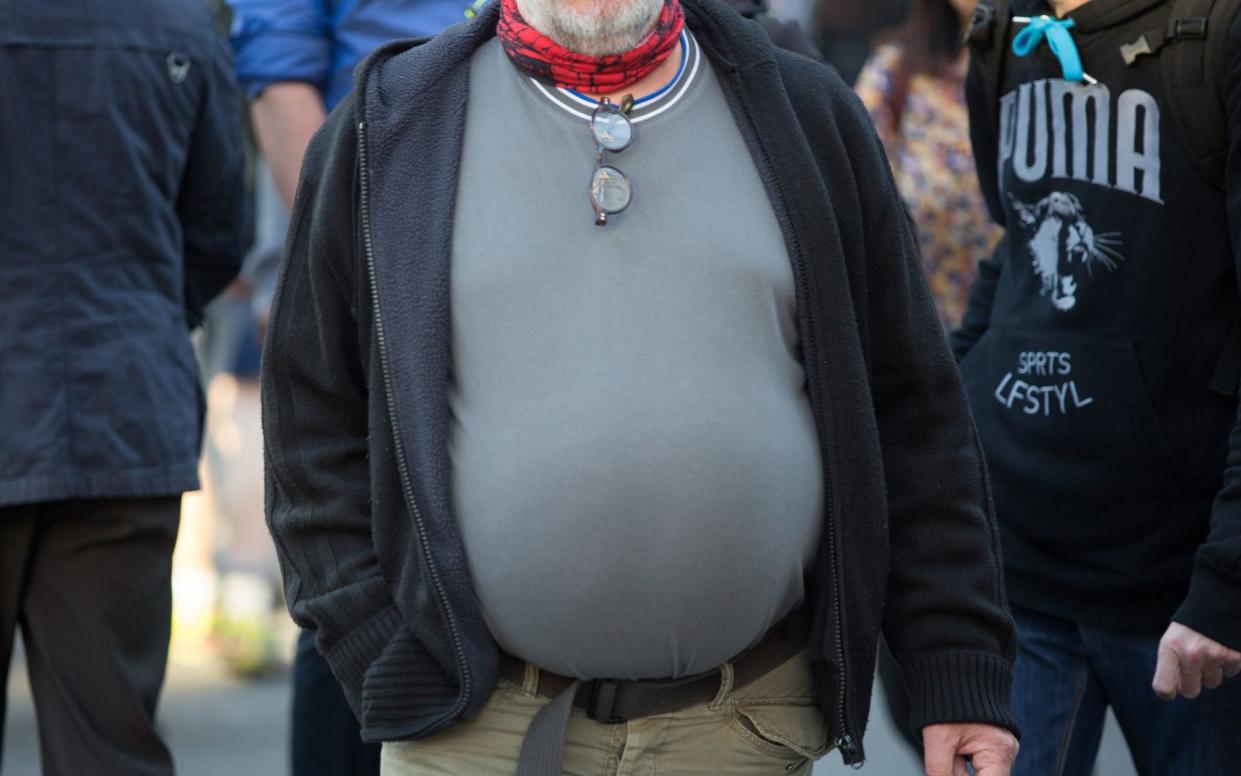Letters: There’s no quick fix for the bad habits now baked into the British diet

SIR – Successive governments have chosen to ignore Britain’s obesity problem (“Fat people are costing us all billions. It’s time to get tough”, Comment, May 14). Tackling it would cost votes because modern, ultra-processed food (UPF) is very tasty (packed with sugar, salt, emulsifiers, stabilisers and many other chemicals) and cheap. It is designed to be irresistible, and hence we overeat.
Cooking and domestic science have been removed from school curriculums, so children are not taught about food, healthy eating or even how to prepare simple meals from natural ingredients. Readymade meals prevail in many households.
The Government should incentivise manufacturers to change their food production models so they factor in benefits to health. However, this will be extremely challenging, and many people are going to die of UPF-related ailments in the meantime.
Peter Wickison
Driffield, East Yorkshire
SIR – To tackle the obesity problem, politicians need to take measures similar to those imposed on smokers.
There should be annual increases in taxes on food bought at unhealthy takeaway restaurants, and restricted opening hours – particularly between 3.30pm and 4.30pm, when schoolchildren flood in. Age restrictions could apply, and pizzas and other calorie-laden products could be placed behind screens at supermarkets.
The Prime Minister seems to be fixated on the purchase of vapes by youngsters. As ever he is showboating rather than tackling the serious problem of overweight teenagers.
David N Booth
Cheadle, Cheshire
SIR – Levels of obesity in Britain are frankly depressing, and food portions in restaurants are a major contributory factor.
I can never finish a pasta dish or Sunday roast dinner, as the helpings are enormous. I had to ask a waiter who delivered spaghetti bolognese whether I should eat it or climb it. In the end I managed just more than half.
I am the same weight now, aged 72, as I was when I was 18: it takes effort and perseverance. Or maybe I am just lucky.
Andrew Munday
Shoreham-by-Sea, West Sussex
SIR – Why am I not surprised by your report (May 14) that Britain imports 80 per cent of its fruit?
Here in the Garden of England, I watch in despair as acre after acre of top-quality fruit-growing land is torn up for housing. Apples, pears, cherries and hops were once grown all around us. Sadly now all we can see is houses.
Once again our Government has failed to plan, sacrificing food security and relying instead on imports. Surely, as the world becomes increasingly unstable, we should be making food and energy security our top priorities.
Stan Kirby
East Malling, Kent
GPs’ wellbeing
SIR – Your report (“GPs in crisis”, Magazine, May 11) on the suicide of GPs reveals a deeply saddening situation. I can vouch for its truth, having been a GP for 40 years and dealt with colleagues in my role as an appraiser.
The point about physician associates is crucial. It is magical thinking to believe that a two-year masters course, often with a 100 per cent pass rate, can equip anybody, however clever, to carry out the role of a GP, which requires at least 10 years of training. GPs working with PAs often find that they generate work rather than save it, because they require such a high degree of supervision. They take doctor time away from patients and create an additional barrier to seamless high-quality primary care.
It is well overdue for the money spent on them to be re-allocated to the employment of doctors and nurses.
Peter Burke
Marsh Baldon, Oxfordshire
Defence pledges
SIR – Rishi Sunak and Sir Keir Starmer both claim that they will make the security of our country a priority in the face of increasing threats (report, May 14). However, their words do not match our capability to provide the deterrence required.
Our Armed Forces have been gutted, and the pledge to increase defence spending to 2.5 per cent by 2030 is a hollow promise. They need an uplift as a matter of urgency, and I would suggest an increase to 3 per cent is necessary now to ensure that the security of our country is safeguarded.
Lt Col Jeremy Prescott (retd)
Southsea, Hampshire
SIR – Lord Cameron has urged Nato countries to step up defence spending to 2.5 per cent of GDP (report, May 9). These seem like strong words, until you look at the UK’s feeble example of 2.5 per cent by 2030.
Lord Dannatt is better informed, I would suggest, and he is advocating 5 per cent (report, May 7). This is more akin to spending during the Cold War, and we are probably back in such a conflict now.
As for “doing too little, too late”, where has Lord Cameron been for the past two years? This has been Western policy throughout the war: give Ukraine enough not to lose, but not enough to win.
David Conroy
Christchurch, New Zealand
Why mowing matters
SIR – Mowing verges (Letters, May 14) is about safety, not just aesthetics. Clear sightlines help drivers spot horses and cyclists sooner. Walking between villages is safer when one can hop on to a verge to escape traffic, and many walkers have to use the road where field footpaths don’t connect.
Unfortunately our council excavates “grips” – trenches across the verge used for draining the road – rather than burying pipes, and these ankle-breakers become invisible once the weeds have grown up level with the verge. So we have to strim them, too.
But the effort is worthwhile whenever one sees people and their dogs strolling safely on the verge, where otherwise they’d be dodging 50mph traffic.
People who say verges should grow wild mainly admire the countryside from behind a steering wheel.
Mike Wells
Ickwell, Bedfordshire
SIR – As long as road junctions are kept clear, it’s fine by me to let verges grow. A lot of the “weeds” are very pretty and are certainly good for wildlife.
James Fuller
Cornhill-on-Tweed, Northumberland
Using AI to get a job
SIR – Broadening the job candidate pool by opening roles up to online application seems like a good way to find the best people. The many thousands of applications are beyond the capabilities of firms to assess by manual means, so AI is required to reduce the pool to a manageable number.
From the firm’s angle, this makes sense. However, from the applicants’ point of view, it’s a disaster (“‘This is my 85th job application – and so far I’ve only spoken to AI bots’”, Money, telegraph.co.uk, May 12). Their chances of being selected have plummeted, so they must now apply for hundreds of jobs to find a way through the multi-stage process.
I know of graduates taking a year or more to secure a position. The process now demands a dedication of time and effort that is beyond reasonable. The next stage will inevitably be that, in order to generate the number of applications required to get a job, the applicants themselves will turn to AI.
We will soon have AI assessing applications made by AI. I’m not sure if this will lead to a better deployment of graduate talent than the old personalised milk round system.
Guy Palmer
St Albans, Hertfordshire
Slick service
SIR – On Monday, when our car’s fuel-tank filler cover refused to open, we were treated to a memorable object lesson in where to find help. At the main dealer franchise, two smart receptionists offered us coffee, swish chairs, and an indeterminate wait, accompanied by mutterings about lunch breaks, other clients and the need for the car to go to the workshop.
With a long journey ahead, we opted instead for our small local garage, where the friendly receptionist swiftly found someone on the garage floor. This helpful person promptly made his way to our car, saying confidently: “I can sort it.” Which he did, in under two minutes, with no workshop visit.
The service was exemplary.
Dr Anne Keene
Cuddesdon, Oxfordshire
SIR – Since I turned 60, young women think it’s fine to address me as “my lovely”, or something similar, when serving me in pubs or cafés. Young men address me as “mate” or “buddy”.
They don’t know me, but seem to assume that instant familiarity is appropriate. I don’t expect anyone to call me “sir”, but surely there’s a happy medium.
Richard Cheeseman
Yateley, Hampshire
Let petrol motorcycles ride on into the future

SIR – I read with dismay that the Government plans to ban the sale of new petrol motorcycles by 2040 (report, May 13).
I wonder if the consultation included anyone outside a city, where I agree that e-scooters are practical for commuters. For most bikers who do live outside cities, however, practicality is not the main consideration. Using a motorcycle is about the enjoyment of riding with friends, travelling long distances to points of interest, taking in beautiful vistas, smells and surroundings, talking nonsense. It’s a way of life.
Electric motorcycles are dull, range-inefficient and dangerous (loud pipes save lives). By 2040 I will be nearing the end of my riding days, owing to age, but I fear for younger generations who will not experience such thrills. This ban, alongside AI, is just one more nail in the coffin for the human species.
Adrian Flude
Montgey, Tarn, France
A disgraceful failure to improve maternity care
SIR – Judith Woods’s article (“NHS maternity care gave me PTSD – 20 years on, nothing has changed”, telegraph.co.uk, May 13) reminded me of an occasion 30 years ago when I was lobbied by a woman who had suffered extreme pain and trauma during the birth of her first child. She wanted assurances that she would be entitled to, and able to secure, adequate pain relief during any future deliveries.
As a practising healthcare professional, and at the time married to her local MP, I tried to advocate on her behalf. She lived in rural Essex, where maternity hospitals were often separate from general hospitals. The former did not routinely have on-call anaesthetists to administer epidurals; instead they had to bleep an anaesthetist in emergency situations, often leading to painful, risky delays. When I queried this with a senior male GP and highlighted the case of my husband’s constituent, he replied: “It’s not called labour for nothing.”
Sadly it would seem that this abhorrent view has not changed.
Ancilla Shirley
Nayland, Suffolk
SIR – It sounds as though maternity care has deteriorated since I had my three children 30-plus years ago.
Two were born in Taunton, with excellent attendance during the births. The gold standard, however, was the birth of my eldest in Vancouver in 1987. The pregnancy was normal until the baby turned breech at 37 weeks. Once I was in labour, my obstetrician was called (at 10.30pm), and a scan showed that a caesarian was necessary. An epidural was administered and the baby was born at 11.58pm. I was then moved to a private, en suite room for six days. Food was tailored towards recovery, help was given with breastfeeding and exercises took place in a small gym – all free of charge.
Jeanne Leader
Taunton, Somerset
Letters to the Editor
We accept letters by email and post. Please include name, address, work and home telephone numbers.
ADDRESS: 111 Buckingham Palace Road, London, SW1W 0DT
EMAIL: dtletters@telegraph.co.uk
FOLLOW: Telegraph Letters @LettersDesk
NEWSLETTER: sign up to receive Letters to the Editor here

